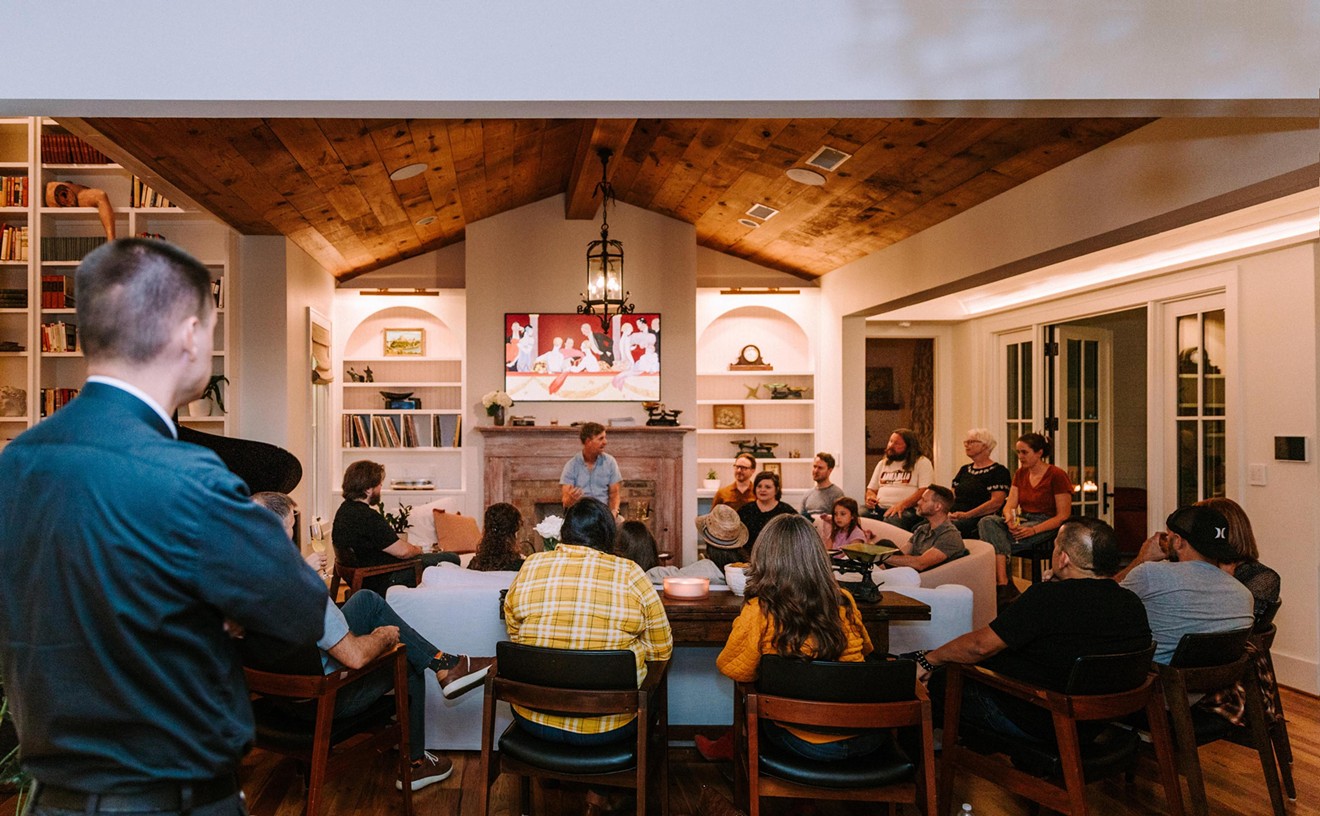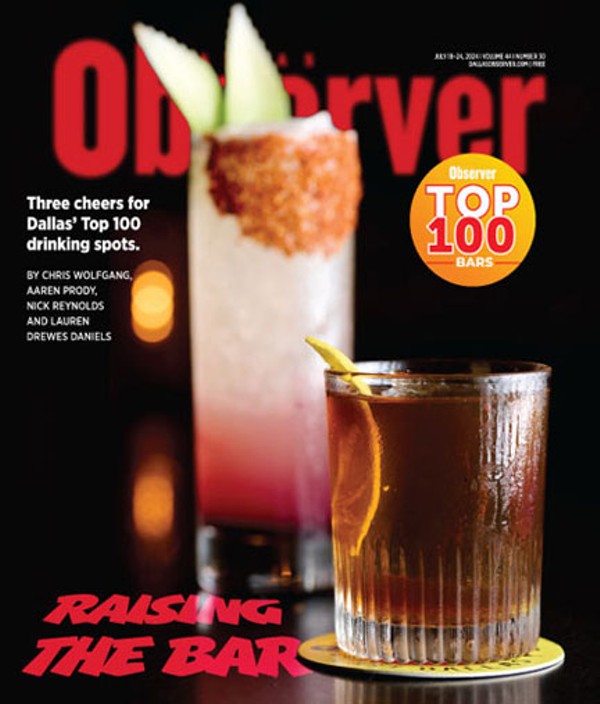It's difficult to explain why I had chosen not to participate, and therefore not easy to articulate why I decided to join this year. My resistance was not some gesture toward sticking it to The Belo Man, nor was it because I exchange icy stares with Tom or his Morning News colleague Lawson Taitte at production intermissions; both are nice guys, even when they're dead wrong. In all seriousness, I felt vaguely that subsuming disparate critical voices beneath the banner of a Forum award was antithetical to the very nature of criticism, which is supposed to be individuals shouting opinions into the creative winds until they're hoarse. When we meet in the drawing room, we critics are supposed to bicker good-naturedly amongst ourselves, port glasses and smelly cigars held aloft, not hold hands and resolve our petty differences in the form of a collective nod of approval to a handful of artists. And awards are kinda icky anyway, right?
Actually, it was my coming to believe that the Leon Rabins, assailed as a "popularity contest" from some corners, had this difficult-to-quantify value to the long-term development of a diverse and woefully overlooked theater scene that convinced me to throw my hat into the Dallas Critics Forum ring. Both are symbols of encouragement: "We like your work. Please do more." And both, hopefully, send a message to those inferiority-complex-addled whiners about culture: "Shut up and come see this company."
As a matter of fact, when we critics met to consider the awards, we had a laugh-filled Saturday afternoon in the lovely Lakewood home of The Weekly's critic Martha Heimberg. Fried chicken and Chianti, not port and cigars, were the consumables of the hour. Yes, opinions were passionate (though there was a surprising amount of consensus), and yes, citations were given to productions that didn't enthrall me (namely, Undermain's The Seagull and Dallas Theater Center's Long Day's Journey Into Night). Dallas Voice critic Hugh Johnson adored Undermain's Uncle Bob, which for me was the staged version of a gastrointestinal acid reflux disorder. The middle ground was reached with a "Best Actor" award to Cameron Cobb in Uncle Bob--to justify my agreement, I convinced myself I was voting in next year's Forum, mentally crossed out Uncle Bob, and substituted Therese Raquin, in which Cobb gave a smashing performance. Denial is an important ingredient for successful cooperation among critics.
Apparently, the 1998 Leon Rabin Awards presentation, held the Monday after Halloween at the Irving Arts Center, was also a convivial effort for all involved. I was unable to attend, but various reports have floated back to me from sources that are never less than bone-blunt about the Dallas theater scene that suggest there was a warmth this night that united even normally adversarial factions. Every handshake, every compliment, every expressed desire by one artist to work with another seemed genuine. If not, these actors and directors were giving the performances of their lives.
This harmonic convergence may very well be the primary function of the Leon Rabins, easily outdistancing the rather dubious phenomenon of lumping together a series of disparate productions and performances and declaring one the best by rewarding it with a trophy. It's the same with the Oscars or the Tonys or that regional journalism presentation known as the Katies, where statuettes are given away by the wheelbarrowful in categories like "Best Press Release" and "Best Annual Report" (and no, I'm not bitter because I was a finalist four years ago and didn't win). Like all those kudos, the Leon Rabin itself is empty, a false god, a graven image--its meaning is derived from the symbolic gathering of people at its feet. In an arts-hostile world, the kind of intimate and inquiring theater that Dallas' best companies do so well must be wrought almost exclusively from a pure love of expression rather than a desire for profit or status. So the value of this ceremonial acknowledgement of theater as common cause shouldn't be trivialized.
But what happens when theater ceases to be the god here, and the graven image, the Leon Rabin, becomes the object of faith? I'm not going to presume to say this has already happened, as the Rabins have been around for only four years. But based on reports--positive and negative--that I've heard, the Rabin ceremony itself has been skewed more toward the glitz-encrusted Tonys than the Village Voice's annual Obie Awards. The Obies are more buttoned-down, boozy, and collegial in their awards-night presentation--one microphone set up in a bar or restaurant, with people gathered at tables smoking, drinking, chatting, and cheering their fellow artists on. Because many of the artists I've spoken to--winners and never-nominated alike--say that they are simultaneously suspicious of the value of arts awards but pleased to gather for an official recognition of the scene, maybe this casual approach would better accommodate their mixed emotions. It might help avoid the potential fetishization of the Leon Rabin, in which winning a trophy becomes thought of as valuable in itself.
And it would eliminate the musical numbers. I know I'll never be honored for my critical contributions to the development of musical theater, but really, people, at all the Oscar-watching parties I've ever attended, the musical numbers were the breaks where you got up to take a piss or refresh the martini pitcher. Or, if endured, they were the gaudy embarrassments that reinforced just how contemptibly shallow the Academy Awards are. A friend once referred to Oscar musical numbers as scratching posts--they're the place to get your claws ready for Sharon Stone's gown.
There seems to be a contradiction between style and content with the Leon Rabins--the Dallas Theatre League apparently wants to mimic nationally broadcast awards ceremonies, but they don't want to reward national talent, or so the rap goes. Tom Sime, a sharp critical mind at The Dallas Morning News, recently wrote an opinion piece in which he chastised Theatre League voters for not choosing some of the national talent that's brought to town, especially by the Dallas Theater Center. He insisted that the Rabins would always be a "cordoned-off Dallas block party" that might be "afraid to compete with national talent" unless they started honoring people like designer Ming Cho Lee, a nationally celebrated artist whom Dallas Theater Center artistic director Richard Hamburger has solicited.
I agree with him that there's a high risk of winner recidivism in something like the Leon Rabin awards, which will only be thwarted if Dallas can develop an array of talented new theater artists (precocious pups like Our Endeavors' Scott Osborne and Patti Kirkpatrick), and convince them to stay here. Otherwise, veterans like Charlotte Akin and Bruce Coleman will have to dedicate Rabin Rooms in their homes to contain the overflow. But really, why shouldn't the Leon Rabins focus on Dallas talent? More bluntly put, will outsiders even give a damn about a still-young Dallas theater award?
Hamburger, whose unpopularity may have been exaggerated by a few embittered artists, has indicated to me that he doesn't feel snubbed and understands completely why Dallas artists have the edge over the national folks he often employs. As far as Hamburger, now himself a Dallas artist, never being chosen as best director by Theatre League voters, he understands that the playing field ain't level to begin with. Comparing the talents of Hamburger and Bruce Coleman is fair, but comparing the Dallas Theater Center's budget to New Theatre Company's is not. Their coffers, not to mention their spaces, create very different theater experiences. If I were a Theatre League voter, I might not cast my ballot for Hamburger either--and not because I think he's an East Coast elitist who thinks Dallas artists are hicks putting on tent shows (hell, for all I know, maybe he does believe this in some moist little drawer of his heart, but if he doesn't recognize the cultural, political, and social mandate for theater artists to create wherever they are, then his parents wasted all that tuition). I would vote for Coleman (assuming he deserved it) because I've seen him elicit nuanced performances in the marvelously detailed worlds he created with little money and cramped space--and theater is nothing if not the art of overcoming limitations.
But Hamburger may be more like your average Dallas theater artist than anyone knows--he shares with friends and foes alike his reservations about the whole idea of declaring one best performance from a precocious, captivating litter. He insists that he feels the same way about the Tony Awards as he does the Leon Rabins. For myself, I don't think there's anything egregious about enjoying the Rabins for its showbiz value alone, if getting gussied up and giving acceptance speeches is your thing. But why not shoot for more? Chicago's theater awards are distributed by a league that offers health benefits and financial aid to that community. They're a long-entrenched institution, of course, which is presumably what the Dallas Theatre League soldiers forward to become. Are there any long-term plans to develop projects to make the difficult lives of dedicated artists a little easier? How about schmoozing a few fat-cat corporations that consider themselves patrons of the arts and convincing them to infuse a Theatre League fund with enough cash to provide more security to uninsured artists? Member theaters taking a more active role in the League's future might facilitate this.
As they are now, I believe that the Leon Rabin awards have some symbolic significance. That significance will snowball the longer they can hang around--presuming that showbiz doesn't overtake community purpose and that a sense of vision is applied in the direction of helping make Dallas a more hospitable place for theater people to live and work. Otherwise, all those precious moments of artists' lives squandered while they sit through musical numbers will have been sacrificed in vain.










